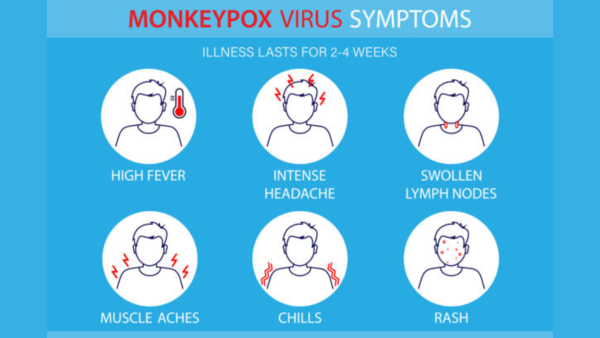According to WHO, “Mpox is an illness caused by the monkeypox virus.It is a viral infection that can spread between people, mainly through close contact, and occasionally from the environment to people via objects and surfaces that have been touched by someone with mpox. In areas where the monkeypox virus is present among certain wild animals, it can also be transmitted from infected animals to people who have contact with them.”
A potential pandemic?
Mpox was once described as a rare disease, but it is now being considered a potential pandemic. With the disease spreading to many countries, there has been a global alert. The Union Health Ministry has instructed all land and airports bordering Pakistan and Bangladesh to be on high alert, and three government hospitals have been designated to ensure isolation, treatment, and management of mpox patients.

Is mpox deadly?
Mpox is a viral infection that can be fatal for young children and people with compromised immunity. A distinctive feature of mpox is a rash that can appear as flat sores, which develop into fluid-filled blisters. The rash can be itchy or painful and may start on the face or in the genital area before spreading to other parts of the body. Other symptoms include fever, headaches, muscle pain, swollen lymph nodes, and inflammation of the rectum. The symptoms resolve between 14-30 days. According to WHO, “Between 0.1% and 10% of people who have become infected with mpox have died.”
How is mpox transmitted?
There are two types of mpox- clade I and clade II and both can be transmitted through direct contact with infected animals, though sexual and physical contact and also through contact with contaminated stuff like towels, handkerchiefs, personal products etc of the patient. So basically it can be transmitted through skin to skin contact and body fluids.
Can Immunization against chickenpox and measles help against mpox?
Chickenpox is caused by the varicella-zoster virus (VZV). It is very contagious and is characterized by a rash that turns into itchy, fluid-filled blisters that eventually dry up. The rash first appears on the chest and stomach and then gradually spreads to the entire body, usually in clusters.There is typically a low-grade fever along with a reduced appetite. The illness lasts about 5-10 days. The overall death rate is about 1 per 60,000 cases, and hospitalizations occur in about 3 per 1,000 cases.
Measles is an exclusively human disease caused by the rubeola virus. Like chickenpox it is very contagious and is characterized by a red rash that covers the body. Other symptoms include a high fever, cough, and runny nose. Patients may also experience a barking cough and red, watery eyes. The illness lasts about 12-15 days. While most people survive measles, complications can occur. About 1 in 4 individuals will be hospitalized, and 1–2 in 1,000 will die.
According to Dr. Tapisha Gupta, Pediatrician and Senior Consultant at Max Super Speciality Hospital, “Measles and chickenpox are caused by viruses unrelated to monkeypox, hence vaccines for these diseases do not provide any cross-protection against monkeypox.”
While chickenpox is caused by the varicella-zoster virus (VZV) and measles by the rubeola virus, immunization against varicella and MMR (measles, mumps, and rubella) does not offer sufficient protection against mpox. The mpox virus, also known as MPV, MPXV, or hMPXV, belongs to a different strain within the Orthopoxvirus genus.
Mpox and smallpox vaccination
Smallpox, caused by the variola virus, is a member of the Orthopoxvirus family, which also includes the mpox virus. Since mpox is related to the smallpox virus, the smallpox vaccine can offer protection against mpox. According to various reports, the smallpox vaccine can offer up to 80% protection, though the level of protection also depends on an individual’s immune system. .
Dr Jatin Ahuja, Senior Consultant, Infectious Disease, Indraprastha Apollo Hospitals, New Delhi says, “The smallpox vaccine offers cross-protection against mpox to some extent due to the shared characteristics of both viruses, which belong to the Orthopoxvirus family. However, it is important to consider that smallpox was eradicated over four decades ago, and routine vaccination was discontinued in most populations. As a result, the majority of people under 40-50 years of age may have never received the smallpox vaccine, and any immunity conferred by past vaccinations could have waned. While it is true that prior smallpox vaccination can offer protection against mpox, this protection is not absolute, and those who were vaccinated many decades ago may not have full immunity. Additionally, newer, more specific vaccines for mpox are not yet available in India, posing further challenges to targeted prevention.”
Who should take the mpox vaccine?
The European Union, U.S., Canada, and a few other countries have approved the MVA-BN vaccine since 2022, following the first large outbreak of mpox. The MVA-BN vaccine, also known as Modified Vaccinia Ankara-Bavarian Nordic, is currently the only available vaccine.
According to Dr. Akanksha Saxena, General Physician and Consultant on Practo, “Mpox, a viral infectious disease, is classified under viral exanthematous fevers and is characterized by symptoms such as rashes, blisters that crust over, fever, body pain, and swollen lymph nodes. While most cases resolve within a few weeks with supportive care, complications can arise in individuals with weakened immune systems.”
How yoga elevates overall well-being
Dr Akanksha says that vaccination against mpox is strongly recommended for certain groups that are high risk. The vaccine should be taken by:
- Individuals with compromised immunity, including patients with HIV or AIDS, and those undergoing immunosuppressive therapy such as steroids.
- Individuals with autoimmune disorders.
- People with multiple sexual partners, sex workers engaging in unprotected sexual activity, and individuals who have had recent contact with someone infected with mpox.
- Those with sexually transmitted infections, as well as bisexual and transgender individuals.
- Occupational risk groups, including laboratory workers and researchers who may be exposed to the virus.
- However, mpox vaccination is not recommended for individuals with a history of severe allergic reactions.


